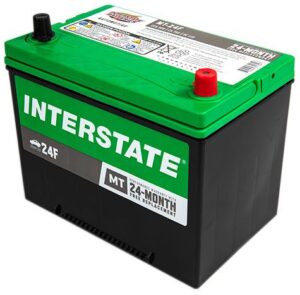When it comes to car ownership, one of the questions that often arises is, “Is the car battery covered under warranty?” Well, the good news is, in most cases, the answer is yes! Car batteries are typically included in the warranty coverage provided by the manufacturer. This means that if your car battery fails within the specified warranty period, you won’t have to bear the expense of replacing it. However, it’s important to understand the details of your warranty agreement, as there may be certain conditions and limitations that apply. So, let’s dive deeper into the topic and explore the ins and outs of car battery warranty coverage.
Is Car Battery Covered Under Warranty?
Having a reliable car battery is crucial for ensuring your vehicle starts every time you turn the key. However, like any mechanical component, car batteries can sometimes fail or experience issues. In such cases, it’s important to understand whether your car battery is covered under warranty and what circumstances may be eligible for warranty coverage.
Understanding Car Battery Warranties
Car battery warranties vary depending on the manufacturer and the type of battery. To determine if your car battery is covered under warranty, it’s essential to consult the warranty documentation provided by the battery manufacturer or the information provided by your vehicle’s manufacturer.
1. Factory Warranties: Vehicle manufacturers often include a factory warranty that covers various components, including the car battery, typically for a specific period of time or mileage. This warranty is offered by the vehicle manufacturer and may vary depending on the make and model of your vehicle. It’s important to refer to your vehicle’s owner’s manual or contact the manufacturer directly to understand the specific warranty coverage for your car battery.
2. Battery Manufacturer Warranties: Battery manufacturers also offer warranties that cover their products. These warranties can vary in terms of coverage and duration. It’s recommended to refer to the warranty documentation provided by the battery manufacturer to understand the specific terms and conditions of their warranty coverage for your car battery.
Factors That Determine Warranty Coverage
While car battery warranties generally offer coverage for a certain duration, several factors can influence the eligibility for warranty coverage. Here are some important factors to consider:
1. Warranty Duration: Car battery warranties typically have a limited duration, which can range from a few months to several years. The duration of the warranty will depend on the specific manufacturer and the type of battery. It’s important to check the warranty documentation to determine how long your battery is covered.
2. Pro-rated Warranty: Some car battery warranties may be pro-rated, which means the warranty coverage decreases over time. This means that if your battery fails after a certain period, you may receive a prorated refund or credit towards a new battery rather than a full replacement.
3. Warranty Conditions: Car battery warranties often come with specific conditions that must be met in order to be eligible for coverage. These conditions may include regular maintenance, such as keeping the battery terminals clean and ensuring proper charging. Failure to adhere to these conditions could potentially void the warranty.
4. Proof of Purchase: When making a warranty claim, it’s important to provide proof of purchase, such as an invoice or receipt. This helps validate that the battery is within the warranty period and that it was purchased from an authorized retailer.
Common Warranty Exclusions
While car battery warranties can provide valuable coverage, it’s important to be aware of common exclusions that may void the warranty. These exclusions can vary depending on the manufacturer, but here are some commonly found exclusions:
1. Improper Installation: If the battery was not installed correctly or by an authorized professional, the warranty may be voided.
2. Misuse or Negligence: Warranty coverage may be voided if the battery is subjected to misuse or negligence. This could include improper charging practices, leaving the battery discharged for an extended period, or using the battery for purposes other than intended.
3. Accidental Damage: Damage caused by accidents or impacts may not be covered under warranty. This includes damage due to improper handling or dropping the battery.
4. Overcharging or Undercharging: Car batteries require appropriate charging to maintain their lifespan. If the battery is overcharged or undercharged, it may lead to premature failure and void the warranty.
Steps to Claim Warranty Coverage
If you believe your car battery is eligible for warranty coverage, follow these steps to initiate a warranty claim:
1. Review the Warranty Documentation: Carefully read the warranty documentation provided by the battery manufacturer or your vehicle’s manufacturer. Understand the coverage duration, conditions, and exclusions.
2. Gather Required Documents: Collect all the necessary documents to support your warranty claim. This may include the original proof of purchase, vehicle information, and any maintenance records.
3. Contact the Manufacturer: Reach out to the battery manufacturer or your vehicle’s manufacturer to initiate the warranty claim process. Follow their instructions and provide the required documentation.
4. Inspect the Battery: In some cases, you may be instructed to have the battery inspected by an authorized service center. They will evaluate the battery’s condition and determine if the failure is covered under warranty.
5. Follow the Manufacturer’s Instructions: Once your warranty claim is accepted, follow the manufacturer’s instructions regarding battery replacement or repair. This may involve returning the battery or visiting an authorized service center.
Understanding whether your car battery is covered under warranty is essential for avoiding unexpected expenses in case of battery failure. It’s important to review the warranty documentation provided by the battery manufacturer or your vehicle’s manufacturer to ascertain warranty coverage, duration, and any specific conditions or exclusions. By adhering to the warranty terms and conditions and addressing any issues promptly, you can ensure a smooth warranty claim process and potentially save money on battery replacement.
Frequently Asked Questions
Is the car battery covered under warranty?
Yes, the car battery is typically covered under warranty, but the specifics may vary depending on the manufacturer and the terms of the warranty. It is important to check the warranty documentation provided by the car manufacturer or the battery manufacturer to understand the coverage details.
What is typically covered under a car battery warranty?
Car battery warranties typically cover defects in materials or workmanship that may cause the battery to fail. This includes issues such as internal cell failure, cracked casings, or faulty connections. However, warranty coverage may not include damage caused by improper installation, accidents, or lack of maintenance.
How long is a car battery typically covered under warranty?
The duration of a car battery warranty can vary depending on the manufacturer and the type of battery. The warranty period usually ranges from 1 to 5 years. High-performance or premium batteries may come with longer warranty periods, while standard batteries may have shorter warranty coverage.
What factors can void the car battery warranty?
Several factors can potentially void the car battery warranty. These typically include improper installation, using the battery for purposes not specified by the manufacturer, neglecting regular maintenance like cleaning terminals, overcharging or undercharging the battery, or physically damaging the battery. It is essential to follow the guidelines provided by the manufacturer to maintain the warranty validity.
Do I need to keep the receipt to claim warranty coverage for the car battery?
Yes, it is generally advisable to keep the receipt or proof of purchase to claim warranty coverage for the car battery. The manufacturer may require this documentation as proof of purchase and to determine the warranty eligibility period. It is recommended to keep the receipt in a safe place along with the warranty documentation.
Can I get the car battery replaced under warranty at any dealership or repair shop?
The warranty coverage for car batteries usually extends to approved dealerships or authorized service centers specified by the manufacturer. It is advisable to contact the manufacturer or refer to the warranty documentation to identify authorized service locations where you can get the battery replaced under warranty. Getting the battery replaced at a non-authorized facility may void the warranty.
Final Thoughts
In conclusion, when it comes to car batteries, coverage under warranty varies. Most car manufacturers offer warranty coverage for a specific period, usually ranging from 2 to 5 years. However, it is essential to read the warranty terms and conditions to determine if the car battery is included. Additionally, factors such as battery failure due to user negligence or wear and tear may not be covered. Therefore, it is crucial to research and consider factors such as warranty length and coverage before purchasing a car battery. So, if you are wondering, “is car battery covered under warranty,” it ultimately depends on the manufacturer and specific warranty terms.


